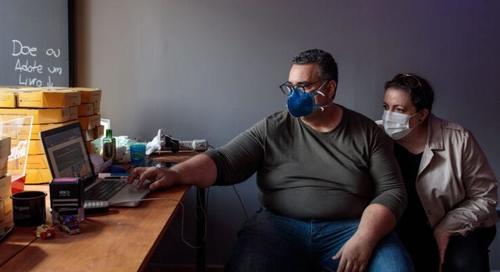Scientists Race To Unlock Mysteries Of "COVID Resistance" Seen In Small Number Of People
Like with virtually every other virus (including HIV), it appears a tiny fraction of the human population are mysteriously immune to the virus. And after a nearly two-year pandemic, scientists are starting to confirm cases of this type of resistance as they seek to study it and learn more about the virus.
Specifically, one scientist in Brazil who has been studying genetic viral immunity (the theory is that the key to the immunity lies within the individual's genetic makeup) for years turned her attention to COVID at the beginning of the pandemic. For a study, she managed to gather 100 couples experiencing "discordant" COVID infection (a "discordant" infection occurs when COVID infects one partner, but not the other, despite them being physically intimate and sharing the same living quarters) to test their DNA, Stat News reports.
There's a difference between patients who are resistance to the virus, and patients who become infected, but are asymptomatic. For many healthier patients, their immune systems will spontaneously clear the irus shortly after infection, preventing them from developing the actual disease that is COVID. These people will typically test positive when tested for antibodies.
Patients who have viral resistance clear the virus before SARS-CoV-2 enters the body's cells, preventing infection entirely.
The Brazilian scientists aren't the only team studying viral resistance as it pertains to COVID. A team of scientists at NYU and the Icahn School of Medicine at Mount Sinai were the first to report finding genes potentially involved in COVID resistance. During the research, the scientists used a CRISPR genome editing technology to disable each of 20,000 human genes in lung cells before exposing them to SARS-CoV-2. Most of the cells died within a few days. "Anything that lives," one of the scientists explained, "is clearly missing something essential for a virus, and so potentially has a significant gene mutation."
In theory, this discovery could help with the development of a genetic therapy that would work by inhibiting the genes that assist with facilitating infection.
In January 2021, the group published a paper in Cell, reporting that RAB7A, a gene important for the movement of cargo from inside the cell to the cell surface, topped their quantitative ranking of genes the coronavirus can’t do without. Inhibiting RAB7A reduces SARS-CoV-2 infection by ensuring ACE2 receptors are retained inside the cell, making them unavailable as the required point of attachment for the spike protein of SARS-CoV-2 (which attaches and then enters the cell).
Although mutations in RAB7A are very rare, according to Sanjana, drugs that inhibit this gene or others required for viral infection could, in theory, be used as a treatment or even be used as a post-exposure prophylactic.
"Amazingly,” Sanjana said, "we found many genes whose loss reduces viral infection. For a subset of these, we identified existing drugs that can be repurposed to inhibit these genes. Some of them are already FDA-approved."
To be sure, it's not clear yet whether this discovery will lead to the development of a related therapeutic. A genetic mutation that blocks HIV infection was discovered years ago, yet no pharmaceutical company as found a workable way to make people resistance to HIV.
Pfizer, Moderna and other vaccine purveyors have plenty of reason to oppose development of a gene-therapy cure for COVID, since it might undermine their vaccine business.
https://ift.tt/3DhhCiO
from ZeroHedge News https://ift.tt/3DhhCiO
via IFTTT


0 comments
Post a Comment